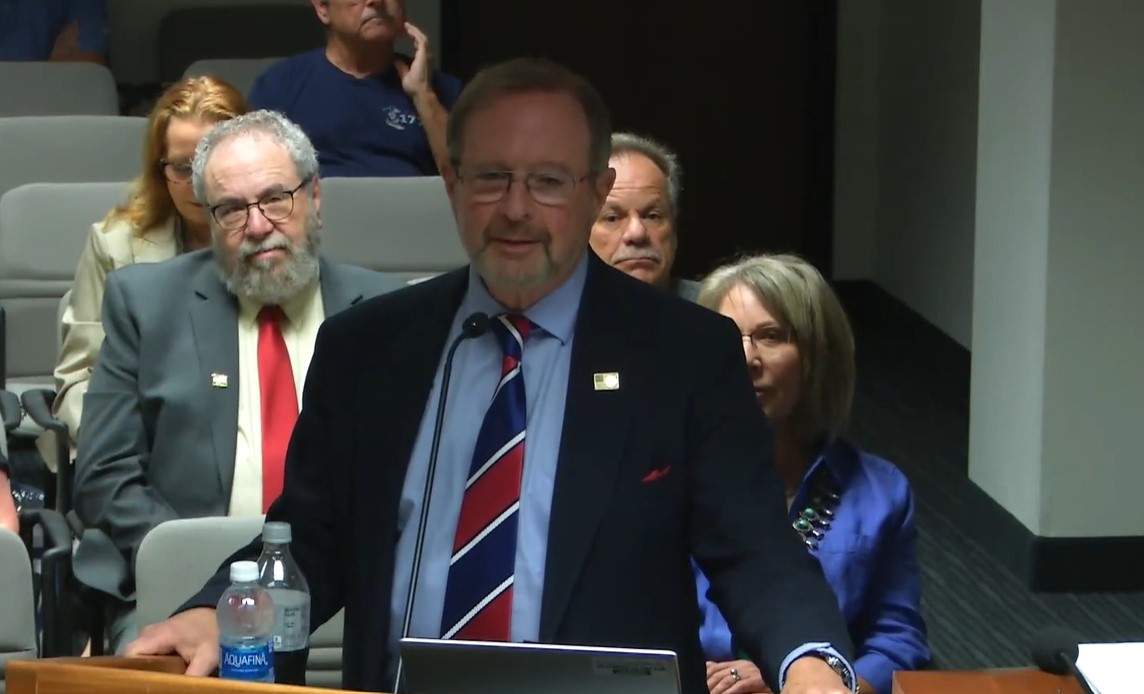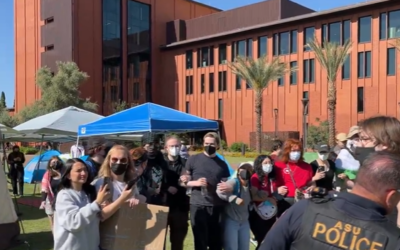By Corinne Murdock |
The Arizona House Ad Hoc Committee on Oversight, Accountability and Big Tech convened on Tuesday to discuss the influence of Big Tech on free speech.
Chairing the committee was State Rep. Alex Kolodin (R-LD03); the two other members were State Reps. Neal Carter (R-LD15) and Cesar Aguilar (D-LD26). The committee heard testimony from Robert Epstein, a renowned psychologist and Big Tech data researcher, and James Kerwin, senior counsel for Mountain States Legal Foundation. More individuals were reportedly scheduled to testify, but Kolodin disclosed that they were unable to do so for fear of retribution by Google.
Kolodin opened the committee meeting with allegations of the “disturbing parallels” between modern society and the fictional world depicted in the book “1984” by George Orwell. Kolodin referenced the Orwellian concepts of “thoughtcrime” and “newspeak,” claiming further that they exist currently.
“That crime was thoughtcrime, and the crime was not merely that you said something wrong, the crime was that you thought wrong, that you weren’t purely of a mind that matched the party’s ideology,” said Kolodin. “There is a fear that is exactly what’s going on in our country today. There’s an attempt to redefine free speech as misinformation.”
Epstein was the first guest speaker. He summarized his ongoing, near-decade data collection of Google’s practice of creating “ephemeral experiences,” or persuasive search engine results, to influence voters. The term was discovered to be regularly used by Google internally via their company emails.
Epstein dubbed Google’s practice the “Search Engine Manipulation Effect” (SEME).
Based on multiple experiments on SEME conducted domestically and abroad, Epstein determined that the practice consistently influenced voters to shift their voting preferences anywhere from 20 to 80 percent.
“The most disturbing set of scientific findings that I’ve ever encountered in my life. The more we have learned, the more disturbed I have become at what I’m finding,” said Epstein.
AZ Free News reported last November that there was an apparent, consistent bias for two Democratic candidates — then-gubernatorial candidate Katie Hobbs and then-secretary of state candidate Adrian Fontes — over their respective Republican opponents, Kari Lake and Mark Finchem.
We reported that search results for “Katie Hobbs” brought up her campaign website first, followed by news reports that portrayed her favorably, her Twitter feed, her Wikipedia page, an endorsement by Emily’s List, her Ballotpedia, and her Facebook.
By contrast, a search for “Kari Lake” didn’t yield her campaign website on any of the first 11 search result pages, and didn’t appear even when omitted results were included. Her search results yielded a Wikipedia page first alongside unfavorable media coverage.
It wasn’t until after our report was published that search results for Kari Lake were modified. Epstein declared during Tuesday’s meeting that Google’s interference resulted in a race-determining advantage for Hobbs.
“If you took Google out of that picture, Kari Lake would’ve won,” said Epstein.
According to Epstein’s data collection, Google would also discriminately deploy voting reminder graphics to certain voters at certain times, with reported favoritism to Democratic voters. Some voters reportedly didn’t get a reminder to vote.
Epstein disclosed that he voted for both Hillary Clinton in 2016 and Joe Biden in 2020, but that he was concerned with Google’s influence over private decision-making.
“I object to the fact that a private company that is not accountable to the public in any way is messing with our elections,” said Epstein.
Epstein proposed implementing a monitoring system that would prevent manipulation from Google in the future.
After an hour break, Kerwin testified on the relationship between government and Big Tech concerning censorship. He explained that government wording in its communications determines whether a constitutional violation occurred. In most cases, Kerwin declared that the open relationship between government and social media companies to monitor speech exists in a “gray area” within the law.
Kerwin cited the ongoing case, Missouri v. Biden, as a “watershed” case on this gray area. The Biden administration was sued for coordinating with social media companies to flag and remove posts, and the federal judge in the case determined that the plaintiffs were likely to prevail based on preliminary evidence produced.
That’s when Kerwin broached the subject of Gov. Katie Hobbs. Kerwin reviewed several emails from Hobbs’ secretary of state staff requesting that Twitter remove certain tweets they classified as misinformation or disinformation.
“This suggests a troubling intention on part of a government official to stamp out speech they disagree with,” said Kerwin.
Corinne Murdock is a reporter for AZ Free News. Follow her latest on Twitter, or email tips to corinne@azfreenews.com.








